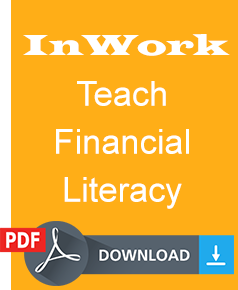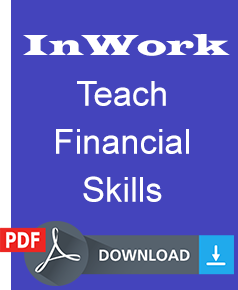Class Materials
Teaching Resources

Teacher Training
Career Development
Financial Literacy
Many organisations such as The OECD Personal Financial Education Group ( PFEG) Jumpstart Coalition and the Council for Economic Education have published recommendations as to what Financial Literacy course topics should be taught to school age students.
The education course content prepared by InWork includes the range of essential topics which leading Financial Literacy educators recommend, but InWork also seeks to provide a broad range of Financial Literacy education content about topics including:
1) Personal Budget
2) Cashflow Planning
3) Understand your Paycheck
4) Types of Financial Institutions
5) Online Banking & Payment systems
6) Credit Score
7) Loan Interest and Amortisation
8) Annualised Percentage Rate ( APR)
9) Cost of Credit Card
10) Cost of Student Loan
11) Cost of Home Loan
12) Inflation
13) Depreciation
14) Bank Interest – Simple or Compound
15) Annual Equivalent Rate ( AER)
16) Financial Risks
17) Insurance Protection
18) Valuation of Stocks
19) Tracker Bonds
20) Unit Trusts
21) Robo Advisers
22) Administration Expenses
23) Tax deductions
24) Pensions & Annuity
25) Return on Investment
26) Islamic Finance

To be able to organise your money is an essential life skill. Financial services are increasingly being delivered using self directed technology such as Mobile, Online and Robo Advisers.
The OECD measures and reports on the level of student attainment in the subject of Financial Literacy across most of the 34 OECD countries. Within America, many States have made it compulsory for high school students to study some classes on Financial Literacy.
This has created a demand for Teachers with skills to teach subject of Financial Literacy. InWork seeks to deliver Financial Literacy education,to increase the participation rate and use of Financial Services. InWork seeks to teach people about the benefits of using Financial Products and the potential risks of over paying or being mis-sold products which are not suited to their needs.
Financial Maths
Having maths skills can help students improve their Financial Literacy.
InWork seeks to make Maths more engaging and relevant to lives of students by making available maths course content which contains many sample calculations to how how money is used in everyday life, such as calculating bulk Discount, calculating basic Salary per hour and overtime, cost of buying goods on Credit, earning a return on Savings and Investments.
Course topics include:
1) Addition
2) Subtraction
3) Multiplication
4) Long Division
5) Fractions
6) Percentages
7) Lifetime Income
8) Cost of Living
9) Personal Budget
10) Price Quotation
11) Cost Apportionment
12) Breakeven point
13) Profit & Loss
14) Gross Profit & Net Profit
15) Cost of Borrowing
16) Return on Savings
17) Valuation of Investments
18) Gross Return on Investment
19) Net Return on Investment
20) Internal Rate of Return ( IIR)
21) Financial Model
22)Inflation – Future value of Money
23) Gross National Product (GNP)
24) Gross Domestic Product (GDP)
25) Foreign Currency Exchange
26) Economic Growth


Enterprise Education
No matter whether you work in an organisation as an employee or your work in your own business, everybody needs basic business skills to negotiate a good financial deal with their Employer or their Customers. People need to understand how much money per hour or per month they need to earn to cover their living costs. Having basic business skills will help people buy products and services at best prices.
InWork provides course content so Teachers can help students learn Business Skills:
1) Examples of Business ideas
2) Examples of Revenue Model
3) Research market
4) Create Minimum Viable Product
5) Route to Market
6) Risk Analysis
7) Operating Costs
8) Budget
9) Cashflow
10) Gross Profit Margin
11) Profit & Loss
12) Balance Sheet
13) Team
14) Source of Finance
15) Write Business Plan
16) Employee Handbook
17) Branding
18) Intellectual Property
19) Online Presence
20) Growth Finance
21) Business Loan
22) Enterprise Value
23) Investor Expectations
24) Shareholder Agreements
25) Board of Directors
26) External Supports

An estimated 75 Million young people worldwide are unemployed. The European Commission, the world Bank and the OECD all say more should be done to teach Entrepreneurship to students at school. But many schools lack the teachers with skills to teach Entrepreneurship and Business Skills.
College graduates may have a degree in a specific niche area, but when they commence work, they find their role requires them to have business skills. InWork can help both school students and college graduates to learn a range of Business Skills required in the workplace.
By learning Entrepreneurship and Business Skills, students can gain vital life skills which can help them succeed in gaining employment or help them create their own job by starting their own business.